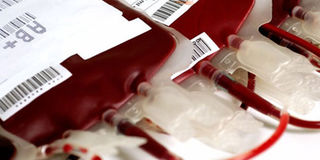Hospitals face blood shortage

What you need to know:
- Ministry of Finance explained that the cuts to UBTS targeted non-core expenditures.
- PEPFAR, donated Shs7.2b annually for the last 15 years until 2016.
KAMPALA. More preventable deaths resulting from the constant blood shortages in hospitals are likely to be registered should government fail to rescind its decision to cut the budget for Uganda Blood Transfusion Services (UBTS), officials have warned.
The UBTS budget was cut by Shs513m (from Shs9.4b in 2017/18 to Shs8.928b) in the next financial year, according to the latest National Budget Framework Paper by the Finance ministry which forecasts government expenditure on different sectors.
Dr Dorothy Kyeyune Byabazaire, the director of UBTS, said ever since the US President’s Emergency Plan for AIDS Relief (PEPFAR) funding ended in 2016, UBTS has been struggling to provide safe and adequate quantities of blood to meet the country’s needs.
“We have put in a request for supplementary funding to be able to finish this year…but we don’t even know whether it will be given,” Dr Byabazaire said in an email response.
The supplementary budget, she said, would cater for medical supplies needed in the collection of blood, whose account at National Medical Stories (NMS) has remained at zero balance, as well as procure fuel to reach out to communities for blood.
Dr Byabazaire said they would require Shs30b to operate at optimal capacity and also serve the other seven regional blood banks effectively.
Currently, the country still falls short of 160,000 units of blood annually since the national blood bank is only able to collect a total of 240,000 units due to inadequate funds.
As a result, blood shortage has on several occasions hit health facilities leading to many preventable deaths with the latest shortage reported in January last year, which forced hospitals, including Mulago National Referral Hospital, to suspend critical surgeries.
Previously, PEPFAR, donated Shs7.2b annually for the last 15 years until 2016, which has created a funding gap in infrastructure development to which it was contributing 45 per cent, buying vehicles and conducing donor sessions.
However, government has not covered the gap.
Although the Finance ministry has since defended the budget cuts that they are not necessarily affecting strategic parts of the sector but other unplanned areas like travels, Dr Byabazaire noted that their activities are travel related as they have to move to communities to collect blood. Officials at UBTS have appealed to Parliament to avert a looming crisis in hospitals across the country.
Ministry of Finance spokesman Jim Mugunga explained that the cuts to UBTS targeted non-core expenditures such as purchase of new vehicles, training and workshops, travel and allowances.
“It’s not only UBTS that has been affected, the cuts are widespread and we are working with the available resource envelop,” Mr Mugunga said.




